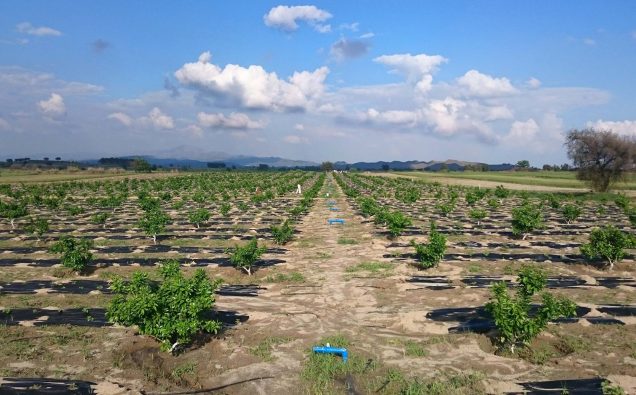
Image: A Pandak Farms orange orchard
A pioneer in high-tech farming in Pakistan, Mossadaq Chughtai, says increasing exportable agricultural products and value-added food items can greatly help the country in meeting the economic challenges
Amplifying exportable surpluses in agriculture sector can be a great way to reduce the food trade deficit that currently stands more than US $ one billion, Mossadaq Chughtai, owner of a sprawling technology-powered Pandak Farms said.
“With the interface of state-of-the-art technologies, the horticulture crops can be produced to achieve exportable surpluses,” the Pakistani-American, who has introduced several water conservation, energy supply and plantation techniques at the Pandak Farms, said.
Currently, high tunnels at Pandak Farms are used to grow off-season cucumber, bitter gourd, eggplant, capsicum and green chilies in addition to exotic papaya fruit.
The entrepreneur, whose Pandak Farms in Attock district of Punjab province, use solar energy and water-saving irrigation techniques, said it is a good time for Pakistan to focus on modernizing its agriculture.
“We should be self-sufficient in view of shortages of staple food items, which we used to import from India. The government should encourage growth and storage of vegetables like tomatoes.”
“Secondly, Pakistan’s food trade deficit shrank to $1.4 billion in the last fiscal year from $2.43 billion a year ago. So, we have all the reasons to do a better job of maximizing agricultural output.”
Pakistan’s agriculture accounts for about 21% of GDP and employs about 43% of the labor force, he noted. Additionally, we have seen in recent years that the food trade deficit expands even in the midst of record wheat and sugar exports.”
This year too, Mossadaq Chughtai said, a delay in the acceptance of some demands of the millers for sugar exports, availability of a smaller surplus of non-Basmati rice and an extended ban on deep-sea fishing during this fiscal year, have diluted the possible gains in food exports.
“So, we have to focus more on high-value products like vegetables and fruit and not just on major crops like wheat and cotton.”


















